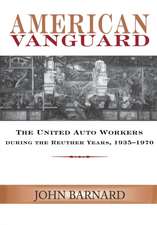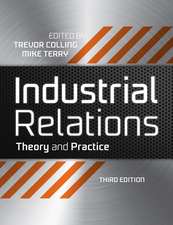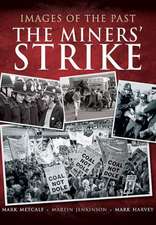A History of British Trade Unions since 1889: Volume III: 1934-1951: A History of British Trade Unions since 1889
Autor Hugh Armstrong Cleggen Limba Engleză Hardback – 10 feb 1994
Preț: 648.14 lei
Preț vechi: 976.29 lei
-34% Nou
Puncte Express: 972
Preț estimativ în valută:
124.03€ • 132.62$ • 103.41£
124.03€ • 132.62$ • 103.41£
Carte tipărită la comandă
Livrare economică 07-14 aprilie
Preluare comenzi: 021 569.72.76
Specificații
ISBN-13: 9780198204060
ISBN-10: 019820406X
Pagini: 472
Ilustrații: tables
Dimensiuni: 161 x 242 x 30 mm
Greutate: 0.85 kg
Editura: Clarendon Press
Colecția Clarendon Press
Seria A History of British Trade Unions since 1889
Locul publicării:Oxford, United Kingdom
ISBN-10: 019820406X
Pagini: 472
Ilustrații: tables
Dimensiuni: 161 x 242 x 30 mm
Greutate: 0.85 kg
Editura: Clarendon Press
Colecția Clarendon Press
Seria A History of British Trade Unions since 1889
Locul publicării:Oxford, United Kingdom
Recenzii
'The lasting value of Professor Clegg's lucid and comprehensive account is to provide a reminder of an earlier period of this century when the unions played a central role in Britain's political and industrial life ... he has an inspiring story to tell which nobody who is interested in the history of the 20th century Labour movement can afford to ignore.'Robert Taylor, Financial Times
'definitive history of the trade unions ... impressive trilogy'Times Literary Supplement
'He has surely demonstrated that trade unions occupied a position at the very heart of British society. His penetrating analysis of their significance provides a starting point from which future historians must measure their own research and analysis. Students will find the book invaluable for its important insights into the interwar and wartime years. The three volumes are an eloquent tribute to Clegg's determination and his commitment to making the trade union movement accessible to future generations.'Times Higher Education Supplement
'Readers of this volume will be indebted to Professor Clegg for its wealth of detail and clarity of presentation.'Keith Burgess, Roehampton Institute, Labour History Review, Vol. 59, No. 3, Winter 1994
It is an impressive achievement by any standards and has powerfully informed our understanding of trade unions not only in britain but throughout the industrialised world...a meticulous, well-crafted and intensely sane account of the spread of bargaining across a startling aray of industries and provides a well-informed and measured assessment of the progress of labour relations in a period which saw the unions move from the insecurity of the Slump to the confident postion of strength in the early 1950's. There is little doubt that Clegg has again contributed an important guide to the complex events which have shaped trade union development in the first industrial nation.
it is Clegg's achievement to demonstrate over a wide industrial canvass and with a judicial blend of economic, political and administrative detail that austerity, depression and the challenges of the immediate post-war period galvanised the trade union movement to an extent sufficient to assuage many of the memories of past failure and containment.
a painstaking and judicious sifting of the evidence, which illuminates not only the unions themselves but also the wider framework of industrial relations...this is a persuasive interpretation, established on firm foundations of archival research. Clegg provides clear and very detailed accounts of the way collective bargaining developed, industry by industry, and useful summaries of other issues that illustrate his theme....this is an important and largely successful volume. Scholars of comtemporary Britain will remain profoundly grateful to Hugh Clegg for completing his trilogy and for the clarity and sound judgement which is to be found therein.
This is the third and concluding volume of a massive survey of British trade untions...It is impossible to summarize such a book, but one can indicate the scope and detail of its conception...Suffice it to say that the coverage is complete...an authoritative account of British trade untionism during a critical period. Students and scholars will mine it as a resource.
'definitive history of the trade unions ... impressive trilogy'Times Literary Supplement
'He has surely demonstrated that trade unions occupied a position at the very heart of British society. His penetrating analysis of their significance provides a starting point from which future historians must measure their own research and analysis. Students will find the book invaluable for its important insights into the interwar and wartime years. The three volumes are an eloquent tribute to Clegg's determination and his commitment to making the trade union movement accessible to future generations.'Times Higher Education Supplement
'Readers of this volume will be indebted to Professor Clegg for its wealth of detail and clarity of presentation.'Keith Burgess, Roehampton Institute, Labour History Review, Vol. 59, No. 3, Winter 1994
It is an impressive achievement by any standards and has powerfully informed our understanding of trade unions not only in britain but throughout the industrialised world...a meticulous, well-crafted and intensely sane account of the spread of bargaining across a startling aray of industries and provides a well-informed and measured assessment of the progress of labour relations in a period which saw the unions move from the insecurity of the Slump to the confident postion of strength in the early 1950's. There is little doubt that Clegg has again contributed an important guide to the complex events which have shaped trade union development in the first industrial nation.
it is Clegg's achievement to demonstrate over a wide industrial canvass and with a judicial blend of economic, political and administrative detail that austerity, depression and the challenges of the immediate post-war period galvanised the trade union movement to an extent sufficient to assuage many of the memories of past failure and containment.
a painstaking and judicious sifting of the evidence, which illuminates not only the unions themselves but also the wider framework of industrial relations...this is a persuasive interpretation, established on firm foundations of archival research. Clegg provides clear and very detailed accounts of the way collective bargaining developed, industry by industry, and useful summaries of other issues that illustrate his theme....this is an important and largely successful volume. Scholars of comtemporary Britain will remain profoundly grateful to Hugh Clegg for completing his trilogy and for the clarity and sound judgement which is to be found therein.
This is the third and concluding volume of a massive survey of British trade untions...It is impossible to summarize such a book, but one can indicate the scope and detail of its conception...Suffice it to say that the coverage is complete...an authoritative account of British trade untionism during a critical period. Students and scholars will mine it as a resource.















